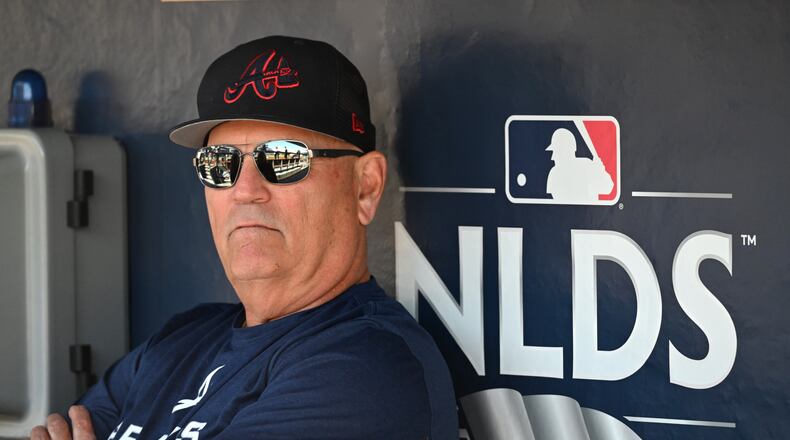The Braves are a great team, yet they have some real weaknesses that potential National League playoff opponents can exploit. None of those flaws are major, which is why the Braves have the best record and run differential in baseball, but nitpicking is what you do with World Series contenders.
Braves starting pitchers have been, collectively, mediocre. The hitters chase a lot of pitchers outside of the strike zone and have produced significantly better against left-handers than righties. The fielding is shaky for at least three positions, and maybe four.
Starting pitching is the relatively largest concern. Braves starters rank eighth among MLB teams in ERA and 12th in Wins Above Replacement (FanGraphs). The caveat is that Max Fried and Kyle Wright have combined for only 10 starts. The Braves are betting that both pitchers will regain their health and form before October.
That’s a reasonable expectation. But two of the best healthy starters have contributed to the Braves ranking in the bottom 10 in walk percentage and home runs allowed per nine innings. Spencer Strider has been about average at preventing homers. Charlie Morton’s walk rate is fifth worst among qualified MLB starters (all statistics before Thursday’s games).
Fried’s return should help. He has a long track record of not walking many batters and surrendering few home runs. Fried is scheduled to start against the Cubs in Chicago on Friday.
A lot is riding on Fried’s left forearm. A strain sent Fried to the injured list May 9. If Fried is Fried, then the Braves will have three proven veteran pitchers for the postseason plus emerging youngster Bryce Elder. I have more confidence that Fried will regain his form than Wright, who struggled with walks and homers allowed before his 2022 outlier season.
Postseason opponents that draw a lot of walks could cause the Braves problems. Several NL playoff contenders fit that bill, most notably the Dodgers. They rank third among NLB teams in walk percentage, followed by the Brewers, Giants, Padres and Diamondbacks. The hitters in those lineups don’t swing at many pitches out of the strike zone, which puts pressure on pitchers.
Braves hitters do swing at a lot of pitches that aren’t strikes. Only the Tigers and White Sox swing at a higher percentage of balls. The Braves strike out at a higher rate than every team except the Angels and Pirates. The Braves collectively crush the ball when they make contact. But they showed during last year’s playoffs what happens when a power-hitting lineup whiffs too much in key situations.
This year, pitchers for the Marlins, Phillies, Dodgers and Diamondbacks are good at getting hitters to chase pitches outside of the strike zone. The Brewers, Padres, Giants and Dodgers and Marlins all rank among the top 10 in strikeout rates for starting pitchers. All-or-nothing offense may not work for the Braves against those teams, just like it didn’t versus the Phillies last October.
Walks, homers and strikeouts are important elements of pitching because there’s a lot of luck involved with balls in play. The randomness increases with the small samples of the postseason. That’s where defensive blunders could hurt the Braves.
Statcast tracking data identifies first baseman Matt Olson and second baseman Ozzie Albies as the infield’s weak links defensively. That fits what my eyes see. Right fielder Ronald Acuna Jr. has a strong arm but doesn’t consistently get to balls that he should. Eddie Rosario is a bad defender in left field and seems to be getting worse.
The margins can be thin in the postseason, and defense can make a difference. Postseason opponents that put balls in play often could give the Braves problems. Hitters for the Cardinals, Padres and Dodgers make a lot of contact. Booting balls in the field or making the wrong play can be backbreaking when the games count for so much.
Postseason baseball is unpredictable. Just look at the Braves. They won it all after they were a middling team for most of 2021. They fell on their faces after winning 101 games last season. Baseball can be a mysterious game.
Braves general manager Alex Anthopoulos figured the Braves were primed for a strong postseason run in 2022. Then came a cascade of bad luck in September. Strider strained an oblique muscle, Fried got sick and some of the team’s best hitters slumped. Next thing you knew, the Phillies were lighting up Fried and Strider while Braves hitters could manage only 13 runs over four games of their Division Series.
Anthopoulos said he was concerned about the team’s bullpen going into the 2021 season. Top lefty A.J. Minter had been sent down to the minors for a month, right-hander Tyler Matzek was “up and down” and closer Will Smith had some “shaky moments” late in the year. Then all three relievers were fantastic during the run to the World Series title.
Anthopoulos was making the point that, while he likes his team’s talent after Tuesday’s trade deadline, it’s hard to say now how the Braves will be going in October.
“You just don’t know, come playoff time, who’s going to do what, how things are going to go,” Anthopoulos said. “I’ll know what kind of team we have going into the postseason (then), if we do end up qualifying.”
That last part was Anthopoulos taking nothing for granted, but there is a near-zero chance the Braves miss the playoffs. They are much more likely to earn the No. 1 seed in the NL. The Braves were favored to win the pennant before the trade deadline, and they remained so after it.
They have some real weaknesses, though, and some potential NL playoff opponents could exploit them.
About the Author
The Latest
Featured


